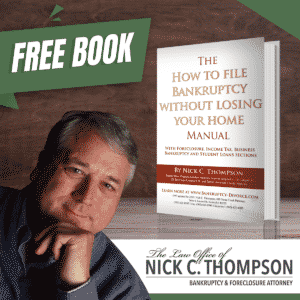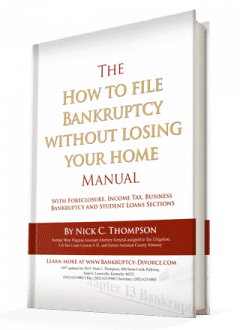Child Support and Alimony is normally non-dischargeable in Bankruptcy. But you can repay child support and alimony in a Chapter 13 Bankruptcy. You can also discharge debt you owe to a spouse or for the benefit of a spouse when it is not alimony or child support in a Chapter 13. Most attorneys get this rule wrong.
In the real world, when someone owes child support they probably also owe other unsecured debts. Child support or alimony often goes unpaid when a debtor is being garnished by an unsecured debt. If you are receiving child support or alimony you may be far better off if your ex-spouse is in bankruptcy. You can file a proof of claim and be paid child support by his Chapter 13 while the unsecured debt is paid little or nothing.
Child Support, Alimony and Chapter 13 Bankruptcy
Child support is always listed as a debt in a petition and it is deducted as an expense. Deducting it as an expense allows you a cheaper Chapter 13 payment or may qualify you for a Chapter 7.
Double dipping and catching support up to date.
You can actually be paid by both the Chapter 13 and by a child support garnishment at the same time. Here is the early opinion of one court on repaying child support through Bankruptcy. It outlines how to pay child support at the expense of your unsecured creditors. Divorced parents can work together so child support is paid at the expense of unsecured debt.
In state court your child support or alimony debt has no priority over a credit card garnishment. If a credit card is the first to issue a garnishment your child support order may not be paid until after the credit card garnishment is repaid in full. But in a Chapter 13 bankruptcy a child support or alimony debt is the first debt which is repaid after the attorney and trustee fees are paid. Child Support even has priority to non-dischargable income taxes. Bankruptcy court gives child support a super priority status in being paid. However, administrative expenses (attorney fees) are paid ahead of priority debts (child support, alimony and taxes).
Not all child support may be non dischargeable.
For child support or alimony to not be dischargeable it must be.
- Owed to an ex spouse, spouse, child or governmental unit
- The Debt must be for alimony or child support. Property settlements are not protected. Mortgage payments which you are required to make may or may not be dischargeable. That depends on whether they are in the nature of support. If it was not specifically set out it was in the nature of support it is normally property settlement.
- Must be court ordered, agreed to by a contract or agreed order or an administrative proceeding.
- Cannot be assigned to a non-governmental agency or person.
Debts to a spouse which are not support can be discharged in a Chapter 13 but not in a Chapter 7. 11 USC 523 (a) 15 and 11 USC 1328 allows this for a Chapter 13. Think settlement agreements where it is ordered that you need to pay for his credit card. A debt you owe to benefit the spouse or a debt to a spouse is completely dischargeable unless it is clearly alimony or child support. Most young bankruptcy attorneys get this wrong.
Domestic Support obligations are paid first as priority debts.
Bankruptcy is a major tool for people who want to collect child support or alimony. The Bankruptcy code defines Child Support and alimony at 11 USC 101 (14A). The Bankruptcy code allows interest and attorney fees as a part of a DSO or child support debt. Priority debts are the most important debts you have to repay in a Chapter 13. 11 USC 507 (a) (1) Gives Domestic Support Obligations or DSOs a Priority status. Non-dischargeable income taxes and domestic support obligations are paid first before secured debt and unsecured debt is repaid. DSO or domestic support obligations of child support and alimony must be repaid in full.
Domestic Support obligations are paid in full with interest.
Bankruptcy code section 11 USC 1129 a (14) states the Court shall only confirm plans which pay child support and alimony in full. Child Support includes not just the amount of the child support. If the judge has allowed attorney fees as part of the DSO or interest that must also be repaid. Occasionally a child support order may include payment for a home or a car or other debt as part of the court order. 11 USC 1322 (2)also set forth that all priority claims must be paid in full.
Bankruptcy requires that the Debtor remain current with his child support
11 USC 1325 a (8) requires the Debtor to remain current during the three or five year plan with his or her child support. If he does not his case can be dismissed. This can be enforced by giving the wife attorney fees for bringing the motion to dismiss and asking for attorney fees.
In order to get the final discharge the Debtor has to certify he is up to date at the end of the plan.
You don’t get a discharge automatically. Instead you have to fill out a one page form requesting a discharge at the end of any Chapter 13 case. This form certifies you are up to date with your child support. 11 USC 1328 requires this certification before discharge as well as the second class.
 Resources for Bankruptcy
Resources for Bankruptcy
Louisville Kentucky Bankruptcy Forms
How to Win Great Chapter 13 Plan Payments • Video
Finishing a Chapter 13 Plan and Getting a Complete Discharge
Chapter 13 Step Plans & Chapter 20 Flexibility to Make a Plan
Chapter 7 or 13 Bankruptcy Trustees and the 341 Hearing
If you are thinking about filing bankruptcy, don’t delay because timing is often crucial. Don’t trust the bank or their attorney for advice. I am here to help you. So, contact my office right away to start the conversation. Nick C. Thompson, Bankruptcy Lawyer: 502-625-0905.

